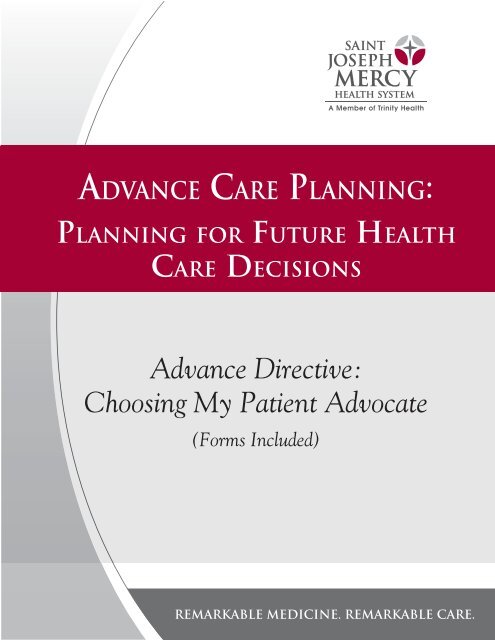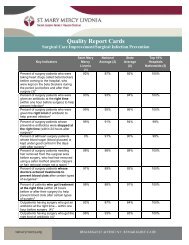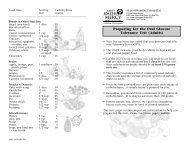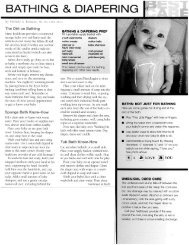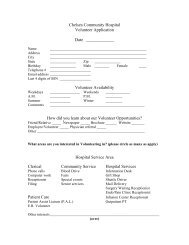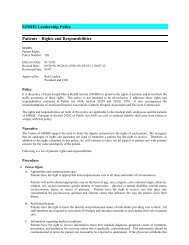Choosing My Patient Advocate - Saint Joseph Mercy Health System
Choosing My Patient Advocate - Saint Joseph Mercy Health System
Choosing My Patient Advocate - Saint Joseph Mercy Health System
Create successful ePaper yourself
Turn your PDF publications into a flip-book with our unique Google optimized e-Paper software.
Unpublished Work (c) 2008 Trinity <strong>Health</strong>-Michigan
A BRIEF GUIDE TO ADVANCE CARE PLANNINGThank you for taking the time to learn about patient advocacy and advance care planning. There are twomajor roles - patient and patient advocate. Both roles are important. The patient must thoughtfully identifyhis/her goals and values and choose an advocate. The patient advocate needs to learn the patient’s goals andvalues as well as realize the responsibility involved.This packet contains three documents:1. “Brief Guide” (which you are reading now): This provides an overview of the process and instructions forcompleting the two forms (see numbers 2 and 3). We strongly suggest that both the patient and the <strong>Patient</strong><strong>Advocate</strong> read this guide and discuss it with each other.2. “<strong>Choosing</strong> <strong>My</strong> <strong>Patient</strong> <strong>Advocate</strong>”: This is the form the patient will complete to name and provideinstructions to the <strong>Patient</strong> <strong>Advocate</strong>.3. “Accepting the Role of <strong>Patient</strong> <strong>Advocate</strong>”: This is the form the <strong>Patient</strong> <strong>Advocate</strong> will complete indicatingthat he or she is willing to serve in that role.INTRODUCTIONAs an adult with the ability to make your ownmedical decisions, you can accept, refuse, or stopmedical treatment. If you lose the ability to makeyour own medical decisions (for instance, becauseof an accident or illness), someone else will haveto make those decisions for you. You can choosethe person you want to make those decisions – thatperson is called your “<strong>Patient</strong> <strong>Advocate</strong>” – and givethat person information about your preferences,values, beliefs, wishes and goals that will help himor her make the decisions you want made. The“<strong>Choosing</strong> <strong>My</strong> <strong>Patient</strong> <strong>Advocate</strong>” form (sometimescalled an Advance Directive) allows you to identifythe <strong>Patient</strong> <strong>Advocate</strong> you have chosen. It alsoinstructs your <strong>Patient</strong> <strong>Advocate</strong> so he or she can acton your behalf.It is important for both you and your <strong>Patient</strong><strong>Advocate</strong> to understand that your <strong>Patient</strong><strong>Advocate</strong> makes decisions only when you lackthe ability to do so. In Michigan, two physicians,one of whom should be your attending physician,have to examine you and declare that you lackdecision-making ability (also called decision-makingcapacity) before a <strong>Patient</strong> <strong>Advocate</strong> can act on yourbehalf.It is also important for you and your <strong>Patient</strong><strong>Advocate</strong> to know that by law in Michigan:• you can designate an alternate <strong>Patient</strong> <strong>Advocate</strong>to act in case your first choice of <strong>Patient</strong><strong>Advocate</strong> is unavailable, but at any giventime only one person can act as your <strong>Patient</strong><strong>Advocate</strong>;• your <strong>Patient</strong> <strong>Advocate</strong> must sign the formentitled “Accepting the Role of <strong>Patient</strong><strong>Advocate</strong>” (or a similar form) before acting onyour behalf; and• your <strong>Patient</strong> <strong>Advocate</strong> can make a decisionto refuse or stop life-sustaining treatment onlyif you have clearly expressed that he or she ispermitted to do so.– 1 –
INSTRUCTIONS FOR “CHOOSING MY PATIENT ADVOCATE”Section 1: Naming Your <strong>Patient</strong> <strong>Advocate</strong>In this section, you will name your <strong>Patient</strong><strong>Advocate</strong>. You may also, if you wish, name analternate <strong>Patient</strong> <strong>Advocate</strong> in the event your firstchoice for <strong>Patient</strong> <strong>Advocate</strong> is no longer able orwilling to serve.Take time to think about who would be a good<strong>Patient</strong> <strong>Advocate</strong> for you.• Your <strong>Patient</strong> <strong>Advocate</strong> can be a spouse or relativebut doesn’t have to be – for some people, a friend,pastor, or co-worker might be the right choice.(Your doctors, or any employees of your doctors orof the hospital you go to, usually cannot serve asyour <strong>Patient</strong> <strong>Advocate</strong>.)• Your <strong>Patient</strong> <strong>Advocate</strong> must be at least 18 yearsof age.• He or she should be someone with whom you feelcomfortable discussing your preferences, values,wishes and goals.• He or she needs to be willing to follow thosepreferences even if that is difficult or stressful andeven if the decisions you would want made aredifferent from the ones he or she would make forhis or her own medical care.• Your <strong>Patient</strong> <strong>Advocate</strong> must be willing to acceptthe significant responsibility that comes with thisrole.In sum, a good <strong>Patient</strong> <strong>Advocate</strong> must be able toserve as your voice and honor your wishes.Section 2: Instructing Your <strong>Patient</strong> <strong>Advocate</strong>In this section, you can inform your <strong>Patient</strong><strong>Advocate</strong> about your preferences, values, wishesand goals. You can give general instructions, specificinstructions, or a combination of both.It is important to let your <strong>Patient</strong> <strong>Advocate</strong> knowany particular concerns you have about medicaltreatment, especially about treatments you wouldrefuse or want stopped. For example, you mightindicate that you would not want breathingmachines, feeding tubes, or IV fluids if you sufferserious brain injury and do not know who you areor where you are. If your <strong>Patient</strong> <strong>Advocate</strong> does notknow what you would want, it is his or her duty todecide, in consultation with your medical team,what is in your best interest.In order to serve you well and to be able to makethe medical decisions you would want made, your<strong>Patient</strong> <strong>Advocate</strong> needs to know a great deal aboutyou. The discussions between you and the personyou choose to be your <strong>Patient</strong> <strong>Advocate</strong> will beunique, just as your preferences, values, wishes,goals, medical history, and personal experiences areunique. Among the topics you might want to discusswith your <strong>Patient</strong> <strong>Advocate</strong> are:• spiritual and religious beliefs, especially thosethat concern illness and dying;• experiences you have had in the past with familyor loved ones who were ill;• fears or concerns you have about illness,disability, or death;• your understanding of any medical conditions ordiseases you have;• what gives your life meaning; and• what sustains you when you face seriouschallenges.Finally, it is important to understand that underMichigan law, your <strong>Patient</strong> <strong>Advocate</strong> can only makea decision to refuse or stop life-sustaining treatmentif you have clearly given him or her specificpermission to make that decision.Section 3: Organ Donation and AutopsyIn this section, you may, if you wish, state yourinstructions for organ donation and/or autopsyafter your death. By law, these instructions must behonored by your <strong>Patient</strong> <strong>Advocate</strong> and your family.Section 4: Signing the Form and Having ItWitnessedIf you are satisfied with your choice of <strong>Patient</strong><strong>Advocate</strong> and with the guidance you have providedto your <strong>Patient</strong> <strong>Advocate</strong>, you will need to sign anddate the statement in Section 4 in the presence ofat least two witnesses. Neither witness can be your<strong>Patient</strong> <strong>Advocate</strong>, spouse, parent, brother, sister,child, grandchild, heir, physician, or employee ofyour physician or hospital. These witnesses thenneed to sign and date the form in the designated– 2 –
space. By signing, they are attesting that theywitnessed your signing the <strong>Patient</strong> <strong>Advocate</strong> formand that they believe you to be of sound mind andunder no duress, fraud, or undue influence.Once the “<strong>Choosing</strong> <strong>My</strong> <strong>Patient</strong> <strong>Advocate</strong> Form”is completed, signed, and witnessed, please makesure that it (or a copy) is provided to <strong>Saint</strong> <strong>Joseph</strong><strong>Mercy</strong> <strong>Health</strong> <strong>System</strong> so that it is available to yourdoctors and other health care providers here. Onrequest, it will be sent to any other doctor or healthcare facility providing care to you. You may give theform to your Advance Care Planning facilitator, oryou may simply mail or fax it to <strong>Saint</strong> <strong>Joseph</strong> <strong>Mercy</strong><strong>Health</strong> <strong>System</strong> – the address and fax number are onthe form.INSTRUCTIONS FOR“ACCEPTING THE ROLE OF PATIENT ADVOCATE”Under Michigan law, your <strong>Patient</strong> <strong>Advocate</strong> (oralternate <strong>Patient</strong> <strong>Advocate</strong>) cannot act on yourbehalf until he/she receives a copy of your <strong>Patient</strong><strong>Advocate</strong> form and accepts the role of <strong>Patient</strong><strong>Advocate</strong> in writing. That acceptance must be ina certain format required by law and must containcertain statements. On the “Accepting the Roleof <strong>Patient</strong> <strong>Advocate</strong>” form, your <strong>Patient</strong> <strong>Advocate</strong>(or alternate <strong>Patient</strong> <strong>Advocate</strong>) must read and signthose statements if he or she is willing to take onthat role.Ask him or her to carefully read those documentsand, if he or she is willing to serve as your patientadvocate, to sign the “Accepting the Role of <strong>Patient</strong><strong>Advocate</strong>” form. Please ask him or her to then mailor fax the signed form to <strong>Saint</strong> <strong>Joseph</strong> <strong>Mercy</strong> <strong>Health</strong><strong>System</strong> (the address and fax number are on theform) so that it is available to your doctors and otherhealth care providers here. On request, that form,as well as the “<strong>Choosing</strong> <strong>My</strong> <strong>Patient</strong> <strong>Advocate</strong>”form, will be sent to any other doctor or health carefacility providing care to you.You should provide your <strong>Patient</strong> <strong>Advocate</strong> with:• a copy of this “Guide”• a completed copy of the “<strong>Choosing</strong> <strong>My</strong> <strong>Patient</strong><strong>Advocate</strong>” form, and• “Accepting the Role of <strong>Patient</strong> <strong>Advocate</strong>” form.– 3 –
– 4 –
SECTION 2:INSTRUCTING MY PATIENT ADVOCATEA. General InstructionsI want my <strong>Patient</strong> <strong>Advocate</strong> to be able to:• Make choices for me about my medical careor services, such as testing, medications,surgery, and hospitalization. If treatment hasbeen started, he or she can keep it going orhave it stopped depending upon my specificinstructions (see below) or, if I have includedno specific instructions, my best interest.This authority includes the authority to makedecisions about life-sustaining treatments. Lifesustainingtreatment may include, but is notlimited to, breathing machines and the givingof fluids and nutrition by use of tubes;• Interpret any instructions I have given inthis form (or in other discussions) accordingto his or her understanding of my wishes andvalues;• Review and release my medical records, mentalhealth records, and personal files as needed formy medical care;• Arrange for my medical care, treatment andhospitalization in Michigan or any other state,as he/she thinks appropriate;• Determine which health professionalsand organizations may provide my medicaltreatment; and• Make choices about my mental healthtreatment, including the ability to consentto forced administration of medicines andinpatient hospitalization.B. Specific Instructions (Optional)I give my <strong>Patient</strong> <strong>Advocate</strong> permission to makethe following decisions.Life–Sustaining Treatment(You may, if you wish, give your <strong>Patient</strong> <strong>Advocate</strong>specific permission to refuse life-sustaining treatmentby initialing below the following statement.)If I reach a point where it is reasonably certain that Iwill not recover my ability to interact meaningfullywith my family, friends, and environment, I wantto stop or withhold all treatments that might beused to prolong my existence. Treatments I wouldnot want if I were to reach this point include butare not limited to tube feedings, IV hydration,ventilators, CPR, and antibiotics.<strong>My</strong> initials: ______________– 6 –Other Specific InstructionsI want my <strong>Patient</strong> <strong>Advocate</strong> to follow thespecific instructions below, which may limitthe authority described above in the GeneralInstructions (section 2, part A)._____________________________________________________________________________________________________________________SECTION 3:ORGAN DONATION AND AUTOPSYBelow are the instructions I want followed by my<strong>Patient</strong> <strong>Advocate</strong> after my death. If my <strong>Patient</strong><strong>Advocate</strong> is unable or unavailable to make thesedecisions, I ask that my next of kin and physicianfollow these requests if possible.Donation of <strong>My</strong> Organs or Tissue:(Initial one choice only and draw a line through thestatements that you do not want.)_________I wish to donate any organs or tissue if I ama candidateI wish to donate only the following organsor parts if possible (name the specificorgans or tissue):__________________________________I do not want to donate any organ or tissueAutopsy:(Initial both the first and second choice, or just onechoice, and draw a line through the statements thatyou do not want.)_________I would accept an autopsy if it can helpmy blood relatives understand the cause ofmy death or assist them with their futurehealth care decisions.I would accept an autopsy if it can helpthe advancement of medicine or medicaleducation.I do not want an autopsy performed on me,unless it is required by law.
SECTION 4:SIGNING THE PATIENT ADVOCATE FORM AND HAVING IT WITNESSEDSignature of the <strong>Patient</strong>I am providing these instructions of my own free will. I have not been required to give them in order toreceive care or have care withheld or withdrawn. I am at least eighteen years old and of sound mind.Signature: ________________________________________________________ Date: _________________Address:________________________________________________________________________________Signature of the WitnessesI know this person to be the individual identified in the <strong>Patient</strong> <strong>Advocate</strong> form. I believe him or her tobe of sound mind and at least 18 years of age. I personally saw him or her sign this form, and I believe thathe or she did so voluntarily and without duress, fraud, or undue influence. By signing this document as awitness, I certify that I am:• At least 18 years of age.• Not the <strong>Patient</strong> <strong>Advocate</strong> appointed by the person signing this document.• Not related to the person signing this document by blood, marriage or adoption.• Not directly financially responsible for the person’s health care.• Not a health care provider directly serving the person at this time.• Not an employee of a health care or insurance provider directly serving the person at this time.• Not aware that I am entitled to or have a claim against the person’s estate.Witness number 1:Signature: ________________________________________________________ Date: ________________Print name _____________________________________________________________________________Address _______________________________________________________________________________Witness number 2:Signature: ________________________________________________________ Date: ________________Print name _____________________________________________________________________________Address _______________________________________________________________________________Advance Care Planning Programc/o Medical Records<strong>Saint</strong> <strong>Joseph</strong> <strong>Mercy</strong> <strong>Health</strong> <strong>System</strong>5301 East Huron River DriveP.O. Box 995Ann Arbor, Michigan 48106-0995Medical Records Fax 734-712-7387– 7 –
ACCEPTING THE ROLE OF PATIENT ADVOCATE<strong>Patient</strong> Name:___________________________________________________________________________<strong>Patient</strong> Date of Birth: _____________________________________________________________________The person named above has asked you to serve as his or her <strong>Patient</strong> <strong>Advocate</strong> (or as an alternate or “back-up”<strong>Patient</strong> <strong>Advocate</strong>).Before agreeing to take on that responsibility and signing this form, please carefully read:1. a copy of the form the person filled out (entitled “<strong>Choosing</strong> <strong>My</strong> <strong>Patient</strong> <strong>Advocate</strong>”) and2. the document entitled “A Brief Guide to Advance Care Planning,” which provides important informationand instructions.Most importantly, take the time to talk to the person choosing you as <strong>Patient</strong> <strong>Advocate</strong> so that you can gainthe knowledge you need to allow you to make the decisions he or she would want made.If you are willing to accept the role of <strong>Patient</strong> <strong>Advocate</strong>, please read and sign the following statement. Yoursignature does NOT need to be witnessed or notarized.I accept the patient’s selection of me as <strong>Patient</strong> <strong>Advocate</strong>. I understand and agree to take reasonable steps tofollow the desires and instructions of the patient as indicated in the “<strong>Choosing</strong> <strong>My</strong> <strong>Patient</strong> <strong>Advocate</strong>” form (orin other written or spoken instructions from the patient).I also understand and agree that:a. This appointment shall not become effectiveunless the patient is unable to participate inmedical or mental health treatment decisions, asapplicable.b. I will not exercise powers concerning thepatient’s care, custody, medical or mental healthtreatment that the patient – if the patient wereable to participate in the decision – could nothave exercised on his or her own behalf.c. I cannot make a medical treatment decision towithhold or withdraw treatment from a patientwho is pregnant if that would result in thepatient’s death, even if these were the patient’swishes.d. I can make a decision to withhold or withdrawtreatment which would allow the patient todie only if he or she has expressed clearly thatI am permitted to make such a decision, andunderstands that such a decision could or wouldallow his or her death.e. I may not receive payment for serving as <strong>Patient</strong><strong>Advocate</strong>, but I can be reimbursed for actual andnecessary expenses which I incur in fulfilling myresponsibilities.f. I am required to act in accordance with thestandards of care applicable to fiduciaries whenacting for the patient and shall act consistentwith the patient’s best interests. The knowndesires of the patient expressed or evidencedwhile the patient is able to participate inmedical or mental health treatment decisionsare presumed to be in the patient’s best interests.g. The patient may revoke his or her appointmentof me as <strong>Patient</strong> <strong>Advocate</strong> at any time and inany manner sufficient to communicate an intentto revoke.– 8 –
h. The patient may waive the right to revoke adesignation as to the power to exercise mentalhealth treatment decisions, and if such waiver ismade, the patient’s ability to revoke as to certaintreatment will be delayed for 30 days afterthe patient communicates his or her intent torevoke.i. I may revoke my acceptance of my role as<strong>Patient</strong> <strong>Advocate</strong> any time and in any mannersufficient to communicate an intent to revoke.j. A patient admitted to a health facility or agencyhas the rights enumerated in Section 20201 ofthe Michigan Public <strong>Health</strong> Code, 1978 PA 368,MCL 333.20201.If I am unavailable to act after reasonable effort to contact me, I delegate my authority to the persons thepatient has designed as alternate <strong>Patient</strong> <strong>Advocate</strong>. The alternate <strong>Patient</strong> <strong>Advocate</strong> is authorized to act until Ibecome available to act.PATIENT ADVOCATESignature: ______________________________________________________ Date: _________________Name (please print):_____________________________________________________________________Address:_______________________________________________________________________________Home Phone:__________________________________ Work Phone: _____________________________Cell Phone:__________________________________ALTERNATE PATIENT ADVOCATESignature: ______________________________________________________ Date: _________________Name (please print):_____________________________________________________________________Address:_______________________________________________________________________________Home Phone:__________________________________ Work Phone: _____________________________Cell Phone:__________________________________Advance Care Planning Programc/o Medical Records<strong>Saint</strong> <strong>Joseph</strong> <strong>Mercy</strong> <strong>Health</strong> <strong>System</strong>5301 East Huron River DriveP.O. Box 995Ann Arbor, Michigan 48106-0995Medical Records Fax 734-712-7387www.sjmercyhealth.org292355 N 6/08 (M) (09450)


